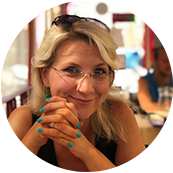Amelie Rosengren
Amelie Rosengren (M.A.) is a historian, author, museum educator, and co-founder of Latinitium. Her research has focused on everyday life from antiquity to the early modern era.

MY LATIN STORY
I HAVE been a history nerd for as long as I can remember. As a child, I found history to be the most fascinating storybook of all, I still do. To most, “history” means the adventures of kings, queens and emperors, wars and revolutions, great discoveries, hunts for witches, black deaths, or slave trade. To me, all of these grand schemes of history never came first. Big events or personas rarely caught my interest. Instead, I found myself drawn to the small things in history.
Small, not insignificant.
The everyday occurrences of the life of previous generations – how things change constantly, but still in many ways, stay the same – or the curious details of past lives. These small oddities or facts, often neglected, can turn a king into a real person or a past era into something tangible and vivid.
This interest of mine brought me to the University, where I got a Master of Arts in History. However, as I could not get enough, I also turned to the History of Ideas – a crossover subject that includes history, philosophy, science, psychology, pedagogy etc. – and got a Bachelor of Arts.
For a long time, I thought my place in the world was in historical archives. However, I found myself working as a Museum Educator at the world’s first open-air museum, Skansen. Here I was able to combine the best of two worlds; my love of history’s everyday stories and ordinary people, and teaching.
My interest has taken me and my research from the depths of medieval archives and defamatory cases to the plight of poor farmers during the industrial revolution. It also brought me to Latin.
As so much of history has been recorded in Latin, I found myself taking Latin classes in upper secondary school and, again, years later at Stockholm University. There I met Daniel Pettersson. In 2016 we started planning for what was to become Latinitium where we combine his experience and passion for the Latin language with my fascination for everything that has been.
Whereas the language and its literature have a central role for Daniel, for me, the important thing is what we can learn about history using Latin as a tool. How much knowledge would not be lost, were Latin to vanish from the minds of men?
Research interests:
Amelie’s research has centred on everyday occurrences, customs and curiosities from European history with a particular focus on food, trade and the daily life of ordinary people.
Milestones
- Master of Arts, History, Stockholm University/Glasgow University
- Bachelor of Arts, History of Ideas, Stockholm University
- Museum Educator, Skansen, Stockholm
- Speaker, Konsumentföreningen Stockholm
- Speaker, Kooperativa vänner, Stockholm
- Textbook author, Pugio Bruti – A Crime Story in Easy Latin
- Author, Slussen – eller Kommissarie Frank Holms Huvudvärk, a novel
- Chronicler, articles concerning the History of food, Restaurang.se
- Teacher, Lärarjouren, Stockholm












